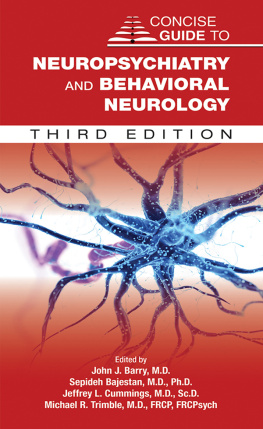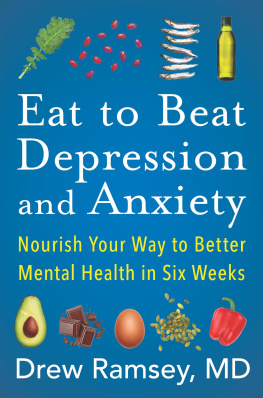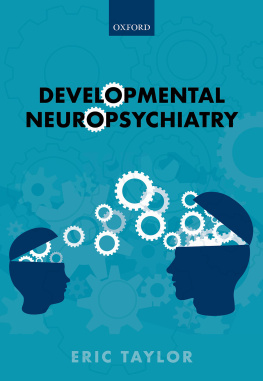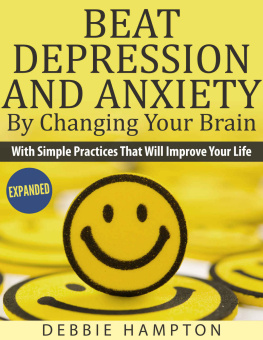heal
your
brain
heal
your
brain
How the New Neuropsychiatry
Can Help You Go from Better to Well
David J. Hellerstein, MD

Disclaimer: This book is not intended to give medical advice and is not a substitute for your personal physician. Do not modify your treatment or prescription dosage without first consulting your physician. While I give specific information about drugs and dosages used in individual cases presented in this book, this is not a substitute for consultation with your own physician. Be sure to follow the treatment regimen he or she recommends for you, and do not attempt to make changes on your own!
2011 The Johns Hopkins University Press
All rights reserved. Published 2011
Printed in the United States of America on acid-free paper
9 8 7 6 5 4 3 2 1
The Johns Hopkins University Press
2715 North Charles Street
Baltimore, Maryland 21218-4363
www.press.jhu.edu
Library of Congress Cataloging-in-Publication Data
Hellerstein, David.
Heal your brain : how the new neuropsychiatry can help you go from better to well / David J.
Hellerstein.
p. cm.
Includes bibliographical references and index.
ISBN-13: 978-0-8018-9883-9 (hardcover : alk. paper)
ISBN-10 : 0-8018-9883-8 (hardcover: alk. paper)
1. NeuropsychiatryPopular works. I. Title.
RC343.H315 2011
616.8dc22 2010022279
A catalog record for this book is available from the British Library.
Special discounts are available for bulk purchases of this book. For more information, please contact Special Sales at 410-516-6936 or specialsales@press.jhu.edu.
The Johns Hopkins University Press uses environmentally friendly book materials, including recycled text paper that is composed of at least 30 percent post-consumer waste, whenever possible. All of our book papers are acid-free, and our jackets and covers are printed on paper with recycled content.
Contents
Introduction
THIS BOOK IS ABOUT what I do every dayevery day that I see patients, that is. About two or three afternoons a week, I leave my office at the New York State Psychiatric Institute and Columbia University Medical Center and drive down the West Side Highway to my private office, to work as a general psychiatrist. For four or five or six hours on those days, long into the evening, I try to apply the latest advances in psychiatry that I have learned in the rarefied world of academia to the people with problems who sit in front of me.
This book is about that process, that practice of psychiatrythe intersection between the latest research advances and the treatment of people who have symptoms and disorders. For want of a better term, I call this approach the New Neuropsychiatry. One of my predecessors at Columbia, , who later became chair of psychiatry at Mount Sinai Medical Center, wrote a book in 1996 called The New Psychiatry, which was about the psychiatry of the DSM-IV.
The DSM (Diagnostic and Statistic Manual of Mental Disorders) was revolutionary nearly three decades ago, when the third (published in 1980) and then the fourth (published in 1994) editions changed how everyone thought about the treatment of psychiatric disorders. The New Psychiatry was all about making the correct diagnosis, based on specific combinations of symptoms, and then deciding which medicine or therapy approach would give the best outcome. It was a major advance for its time, because before the DSM-III psychiatrists could rarely agree about diagnosis or treatment approaches.
Well, Ive been a psychiatrist now for more than twenty-five years, and not long ago it struck me that what my colleagues and I are practicing these days is no longer the New Psychiatry. The best term I could come up with to describe this was the New Neuropsychiatry. In this book Ill talk about why that seems to be the best name for this emerging approach and how it works. Im a little worried that people are going to say, That cant possibly be true! or Thats not how it works!at least for a lot of it. It is the beginning of a new age for psychiatry, though, and a big part of what I am going to do in this book is to explain why that is so.
I have been working at the since 2000. I go to conferences and grand rounds and seminars at Columbia every week, and I hear the research presentations by eminent scientists and researchers, brilliant people coming from Johns Hopkins and Massachusetts General Hospital and the like, and a good many of our own researchers from Columbia. They present rat models of psychiatric diseases or genetic research or they show PET scans of the brains of people who have panic disorder or schizophrenia, and it is great stuff. They talk about how the anticonvulsant Lamictal increases throughput from AMPA receptors (a class of receptors concerned with synapses in the brain that are involved with the chemical glutamate), possibly accounting for the antidepressant effects of that medication. And how mood stabilizer medicines turn on neutrotrophic molecules, which help with cell growth and survival.
My colleagues also talk about how depression is related to decreased activity in the prefrontal cortex and to the when we observe someone elses emotions, when we literally feel for them. I also am intrigued when the speakers talk about other things, such as the epidemiology of mental disorders and phenomenology (which in this context means the main symptoms of various psychiatric disorders).
After a few years of listening to brilliant speakers and to the questions or challenges posed by students and professors in the audience, I began to realize something: all this stuff was starting to connect to what I do when I see patients. After lots of conferences and after innumerable speakers, I was starting to see through peoples skulls. Not literally, but figuratively: I was beginning to gain a sense of their brains at work. Herman Hesse once wrote, The best way to approach the insane is to pretend that you are sane, and in such moments, I would hope that my grip on reality wasnt slipping. Increasingly I began to connect what I see in my office those two or three evenings a week with what is going on in prairie voles and genetically engineered mice and even in that sea slug aplysia.
To put it plainly, I began to sense the connection between brain and mind in my patients. What I mean by this is not only the thinking brain (every word you utter shows that at work), but also the brain as a physical organ, as an emotion- and information-processing and perceiving machine. And I am hardly alone in this. For the first time, general psychiatrists are able to look under the hood of the brain, so to speak, and to start to see what is happening in psychiatric disorders. Or, because a certain amount of humility is involved when talking about an organ as complicated as the brain, to start to see what the evidence suggests is happening in the brain, based on our latest technologies.
A word of caution here: this evidence is not always straightforward or simple. Not every study has the same findings, especially when it comes to MRI imaging or genetic studies. And it can be maddeningly difficult to be sure if the brain changes that we see are a cause of the psychiatric disorder, or a result of it. It is also not always clear if people who have similar symptoms actually have the same brain disorder. Nevertheless, we are making rapid progress toward understanding mental and emotional disorders.
pulses when we were kidshed suddenly grab our wrists during a concert and palpate our radial pulses, or hed look at the base of our necks to watch the retrograde pulse of the jugular vein. He would even hook us up to the bicycle ergometer at his cardiology lab, so we could see the 12-lead printout of our hearts rapid beating as we cycled up imaginary hills.
Next page








